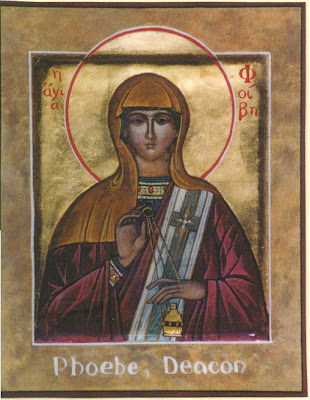St. Phoebe – September 3
The mission of the Church owes an enormous debt to the early apostles and all those who assisted them as they went beyond the Jewish circles of Jesus’ heritage toward all of the world. We are indebted to St. Paul and all who assisted him in a particular way. Besides being the memorial of St. Gregory today, September 3, it is also the memorial of St. Phoebe.
“I commend you to our sister Phoebe, a deacon of the church at Cenchraea, so that you may welcome her in the Lord as is fitting for the saints, and help her in whatever she may require from you, for she has been a benefactor of many and of myself, as well.” So begins the sixteenth chapter of St. Paul’s letter to the Christians in Rome.
The office of Deaconess was mentioned by St. Paul in the letters to the Romans and to Timothy, but we also have evidence of the office in a letter from Pliny, a Roman governor who was writing to the Emperor Trajan for advice on dealing with Christians. He mentions two women ministers among the Christians in Bithynia. The office of Deaconess is also mentioned in the Apostolic Constitutions of Hippolytus, and the office developed greatly during the third and fourth centuries, although it is quite different from the office Phoebe held. The Council of Chalcedon, held in the year 451, legislated that women could become deaconesses at the age of 40. A deaconess was to devote herself to the care of sick and poor women; she was present at the interviews of women with bishops, priests, or male deacons (so that the clergy wouldn’t be alone with strange women) and kept order in the women’s part of the church. Her most important function was the assistance at the baptism of women. For the first five centuries of the Church, people were baptized naked, and so, for the sake of propriety, male deacons couldn’t baptize women. When adult baptism became rare and was eventually replaced by infant baptism, he office of deaconess declined in importance. The office was actually abolished by the Council of Epaon in the year 517, but in the Nestorian Christian communities in Syria, and later in India and China, deaconesses administered Holy Communion to women and read the scriptures in public.
I think that the fact that Phoebe was a deacon in the Church in Cenchreae is important because it shows that women were important to spreading the faith. Women owned house-churches, women administered and supervised the work with the poor and widows, women handled financial affairs for the churches, and women helped spread the gospel. Jesus came to turn everything upside down: the last would be first and the first would be last, and the Church was shaking up the society of Late Antiquity.
This feast of St. Phoebe is in many ways a celebration of the ministry of women throughout the centuries, including my mother and sisters!



I think too of your ministry Donna over many years to the young people at Holy Eucharist Parish. Thank you and may God continue to use you as His instrument!
I believe women played such an active part in the early church that the Romans thought of Christianity as a feminine religion.
Thank You for acknowledging the contributions of women in the history. "Herstory is History"